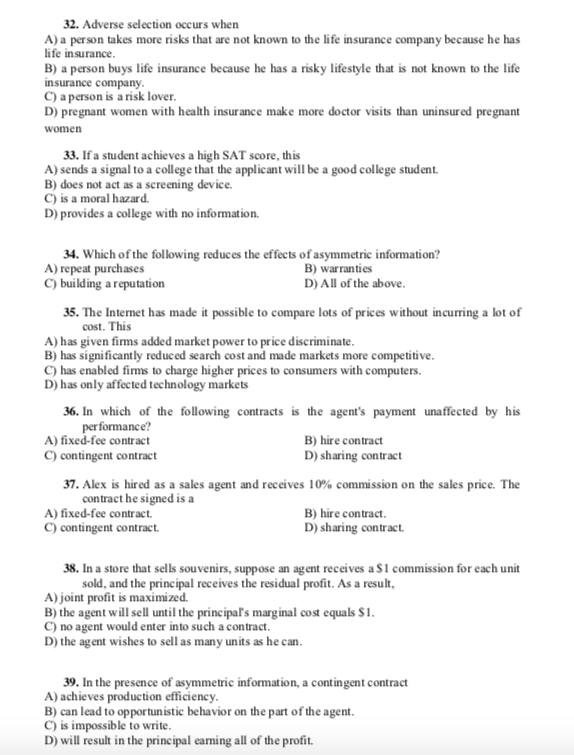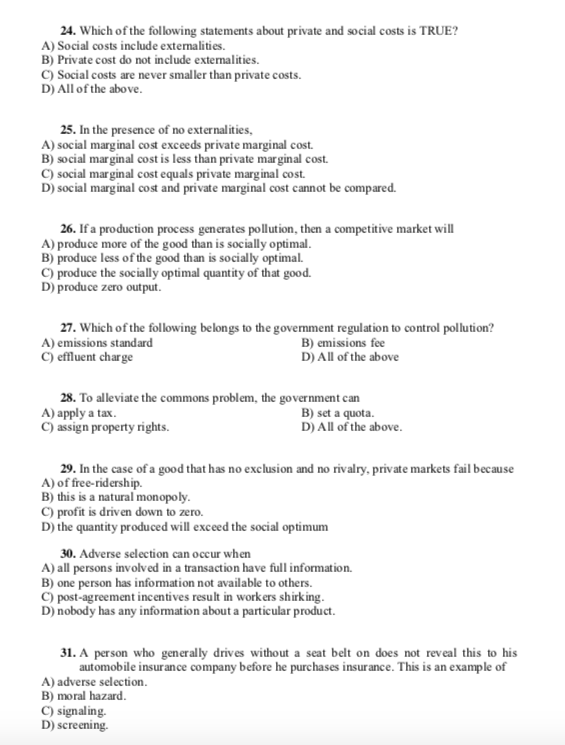32. Adverse selection occurs when A) a person takes more risks that are not known to the life insurance company because he has life insurance. B) a person buys life insurance because he has a risky lifestyle that is not known to the life insurance company. C) a person is a risk lover. D) pregnant women with health insurance make more doctor visits than uninsured pregnant women
32. Adverse selection occurs when A) a person takes more risks that are not known to the life insurance company because he has life insurance. B) a person buys life insurance because he has a risky lifestyle that is not known to the life insurance company. C) a person is a risk lover. D) pregnant women with health insurance make more doctor visits than uninsured pregnant women
Principles of Economics 2e
2nd Edition
ISBN:9781947172364
Author:Steven A. Greenlaw; David Shapiro
Publisher:Steven A. Greenlaw; David Shapiro
Chapter13: Positive Externalities And Public Goods
Section: Chapter Questions
Problem 24P: Assume that the marginal private costs of a film producing fuel-efficient can; is greater than the...
Related questions
Question
Dear tutor, please solve ALL THE QUESTIONS, THIS IS SO IMPORTANT TO ME, PLEASE... THANK YOU SO MUCH!!!

Transcribed Image Text:32. Adverse selection occurs when
A) a person takes more risks that are not known to the life insurance company because he has
life insurance.
B) a person buys life insurance because he has a risky lifestyle that is not known to the life
insurance company.
C) a person is a risk lover.
D) pregnant women with health insurance make more doctor visits than uninsured pregnant
women
33. If a student achieves a high SAT score, this
A) sends a signal to a college that the applicant will be a good college student.
B) does not act as a screening device.
C) is a moral hazard.
D) provides a college with no information.
34. Which of the following reduces the effects of asymmetric information?
A) repeat purchases
C) building a reputation
B) warranties
D) All of the above.
35. The Internet has made it possible to compare lots of prices without incurring a lot of
cost. This
A) has given firms added market power to price discriminate.
B) has significantly reduced search cost and made markets more competitive.
C) has enabled firms to charge higher prices to consumers with computers.
D) has only affected technology markets
36. In which of the following contracts is the agent's payment unaffected by his
per formance?
A) fixed-fee contract
C) contingent contract
B) hire contract
D) sharing contract
37. Alex is hired as a sales agent and receives 10% commission on the sales price. The
contract he signed is a
A) fixed-fee contract.
C) contingent contract.
B) hire contract.
D) sharing contract.
38. In a store that sells souvenirs, suppose an agent receives a $1 commission for each unit
sold, and the principal receives the residual profit. As a result,
A) joint profit is maximized.
B) the agent will sell until the principal's marginal cost equals $1.
C) no agent would enter into such a contract.
D) the agent wishes to sell as many units as he can.
39. In the presence of asymmetric information, a contingent contract
A) achieves production efficiency.
B) can lead to opportunistic behavior on the part of the agent.
D) will result in the principal eaming all of the profit.

Transcribed Image Text:24. Which of the following statements about private and social costs is TRUE?
A) Social costs include externalities.
B) Private cost do not include externalities.
C) Social costs are never smaller than private costs.
D) All of the above.
25. In the presence of no externalities,
A) social marginal cost exceeds private marginal cost.
B) social marginal cost is less than private marginal cost.
D) social marginal cost and private marginal cost cannot be compared.
26. If a production process generates pollution, then a competitive market will
A) produce more of the good than is socially optimal.
B) produce less of the good than is socially optimal.
C) produce the socially optimal quantity of that good.
D) produce zero output.
27. Which of the following belongs to the government regulation to control pollution?
A) emissions standard
C) effluent charge
B) emissions fee
D) All of the above
28. To alleviate the commons problem, the government can
A) apply a tax.
C) assign property rights.
B) set a quota.
D) All of the above.
29. In the case of a good that has no exclusion and no rivalry, private markets fail because
A) of free-ridership.
B) this is a natural monopoly.
C) profit is driven down to zero.
D) the quantity produced will exceed the social optimum
30. Adverse selection can occur when
A) all persons involved in a transaction have full information.
B) one person has information not available to others.
C) post-agreement incentives result in workers shirking.
D) nobody has any information about a particular product.
31. A person who generally drives without a seat belt on does not reveal this to his
automobile insurance company before he purchases insurance. This is an example of
A) adverse selection.
B) moral hazard.
C) signaling.
D) screening.
Expert Solution
This question has been solved!
Explore an expertly crafted, step-by-step solution for a thorough understanding of key concepts.
Step by step
Solved in 3 steps

Knowledge Booster
Learn more about
Need a deep-dive on the concept behind this application? Look no further. Learn more about this topic, economics and related others by exploring similar questions and additional content below.Recommended textbooks for you

Principles of Economics 2e
Economics
ISBN:
9781947172364
Author:
Steven A. Greenlaw; David Shapiro
Publisher:
OpenStax

Essentials of Economics (MindTap Course List)
Economics
ISBN:
9781337091992
Author:
N. Gregory Mankiw
Publisher:
Cengage Learning

Principles of Microeconomics
Economics
ISBN:
9781305156050
Author:
N. Gregory Mankiw
Publisher:
Cengage Learning

Principles of Economics 2e
Economics
ISBN:
9781947172364
Author:
Steven A. Greenlaw; David Shapiro
Publisher:
OpenStax

Essentials of Economics (MindTap Course List)
Economics
ISBN:
9781337091992
Author:
N. Gregory Mankiw
Publisher:
Cengage Learning

Principles of Microeconomics
Economics
ISBN:
9781305156050
Author:
N. Gregory Mankiw
Publisher:
Cengage Learning



Principles of Economics, 7th Edition (MindTap Cou…
Economics
ISBN:
9781285165875
Author:
N. Gregory Mankiw
Publisher:
Cengage Learning